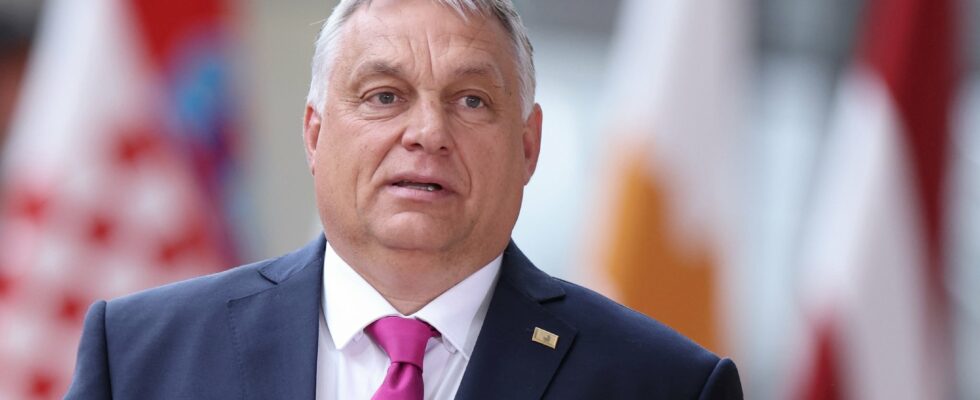The verdict was delivered on July 10, on the sidelines of the NATO summit in Washington. For Charles Michel, President of the European Council, the recent visit to Moscow, to meet Vladimir Putin, by Hungarian leader Viktor Orbán was a “political mistake”. And what about his visit to Beijing to meet Chinese President Xi Jinping – both trips having been made without informing his European partners. Enough to immediately tarnish the Hungarian presidency of the Council of the EU, which began on July 1, for a period of six months.
Brussels is considering countermeasures as Orbán is due to address the European Parliament in September. Some want Poland, the next country on the list of rotating presidencies, to take over on 1 September. For now, Europe is sticking to the “yellow card” sent on 10 July by the ambassadors of the member states. The chair of the Renew group, Valérie Hayer, called on Thursday for Viktor Orban to no longer hold the presidency of the Council of the EU. The Commission is also trying to avoid travelling to Budapest, where it is expected at the start of the school year. No place was found for a speech by Orbán during the inaugural plenary session of the European Parliament, from 16 to 19 July. And at a meeting in Budapest of the Competitiveness Council, a formation that brings together EU ministers several times a year, only seven out of 27 countries sent ministerial representatives.
“Disrupt the EU”
And while Viktor Orbán boasts about his “peace missions”, his Minister for European Affairs, János Bóka, is trying to alleviate European concerns about Budapest’s provocations. In fact, a boycott of his presidency would be just another step in the standoff between the Hungarian troublemaker and the Twenty-Six. In December 2022, Europe froze billions of funds in response to repeated breaches of the rule of law. In December 2023, it dismissed the pro-Russian Orbán to vote for the start of accession negotiations with Ukraine. And on June 13, the Court of Justice of the EU sanctioned Hungary with a record fine for non-compliance with the continental asylum policy. “Viktor Orbán is using and abusing his presidency to demonstrate his political autonomy, undermine the common positions of the member states and, ultimately, disrupt the EU,” says Dániel Hegedűs, an analyst at the German Marshall Fund Institute. “The legal way to shorten the Hungarian semester exists, but the political will is absent. However, given the escalation of recent days, I would not be surprised if this path is seriously considered soon,” adds the political scientist.
On July 20, Hungary will be expected to make a big impact at a meeting of European foreign ministers. Budapest will decide whether or not to maintain its veto on the European Peace Facility, the EU’s tool for reimbursing member states’ arms and munitions deliveries to kyiv. In the meantime, Orbán continues his illiberal world tour. The NATO summit has barely ended when he is in Florida meeting Donald Trump, whose return to the White House he strongly supports.
Snub for Meloni
In addition to his diplomatic marathon, which fuels his ambitions to become an intermediary between the West and the giants of the East, Orbán has just achieved a feat in the European Parliament by creating “Patriots for Europe”, a vast national-populist group that the Hungarian tribune had been dreaming of for years. Launched with a bang in Vienna on June 30, the Patriots bring together 84 MEPs from twelve countries and fourteen parties. Including Orbán’s Fidesz, the National Rally, the Austrian FPÖ, Geert Wilders’ Dutch PVV, the Portuguese stable Chega and the Spanish party Vox, which he managed to wrest from the sovereignist family (European Conservatives and Reformists) of Giorgia Meloni. A snub for the President of the Italian Council, who had refused to integrate Orbán into her group because of his pro-Russian positions.
Why create this group? To have a platform… and to restore credibility in his own country. Shaken in Hungary by the sensation Péter Magyar, a former senior official of the regime that went into rebellion in mid-February and became its main opponent, Viktor Orbán emerged weakened from the European elections of June 9. Credited with 44% of the vote, Fidesz suffered its worst continental result since Hungary joined the EU (2004). Between his Patriots eager to “transform Europe” and his diplomatic maneuvers outraging the EU, Orbán therefore intends to lead a new crusade against Brussels. And to divert the population’s attention to one of his favorite scapegoats. At least until the 2026 legislative elections.
